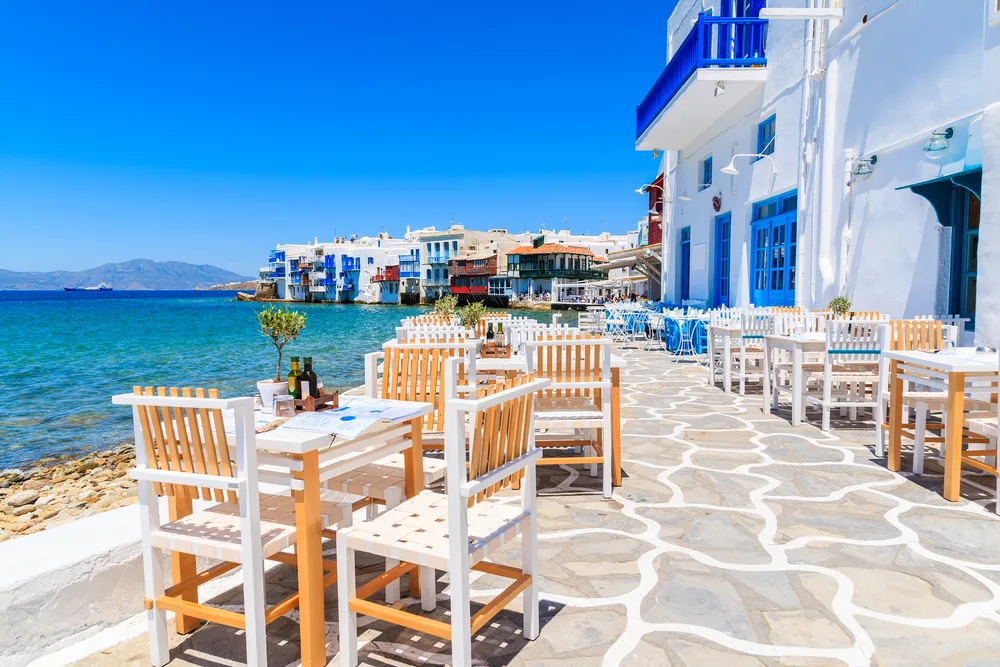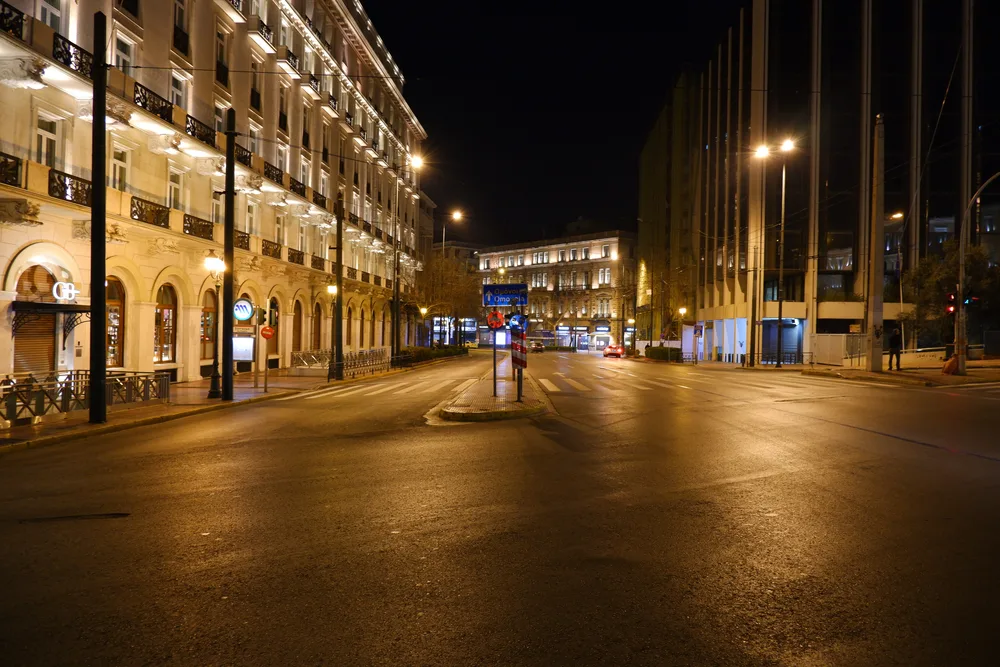How safe is Greece to visit?
Greece is generally a safe destination for travelers, but petty crimes like pickpocketing and scams can occur, especially in tourist areas. While violent crime is relatively rare, incidents of assault have been reported, particularly in certain nightlife areas and neighborhoods. Travelers should exercise caution during protests and avoid excessive alcohol consumption to minimize risks.
The beautiful Mediterranean country of Greece is one of the world’s most popular tourist destinations. About 33 million people visit the country each year.
Lovers of history will want to see remnants of the Ancient Greek civilization, such as the famous Acropolis in Athens or the Sanctuary of Apollo at Delphi. The Greek islands such as Santorini and Mykonos are home to perfect beaches and lovely nightlife.
Or get away from the main tourist destinations and take in some of Greece’s lesser-known destinations such as the lunar landscapes of Meteora or Greece’s historic second city Thessaloniki.
There is plenty to do in Greece, and plenty of enjoyment to be found in the delicious food, café culture, and relaxed lifestyle. However, you won’t be so relaxed if you are the victim of a crime, which is why it is important to research safety information before you go.
This travel guide offers a detailed glimpse into traveling to Greece. Keep reading to learn about any challenges you might encounter, from crime to natural disasters.
Is Greece Safe to Visit in 2025?

Serenity-H/Shutterstock
Yes. Greece is mostly a safe destination! However, don’t be fooled by the picture-perfect images as there are plenty of ugly truths lurking beneath the surface.
Be prepared for high rates of petty crime as well as other incidents, such as civil unrest, that might affect you while you are there.
Travel advisories issued by your own government or other governments are a good place to start when researching the safety of a country such as Greece.
Some governments warn their citizens to exercise some caution in Greece due to the risk of civil unrest, terrorism, and crime. For example, the New Zealand government issues a Level Two travel advisory for Greece for those reasons.
Common problems present in Greece include:
- Pickpocketing
- Bag snatching
- Robbery
- Drink spiking
- Sexual assault
- Violent demonstrations
- Hate crimes
While these problems are present, and governments have an obligation to warn people about the risks they might encounter when they travel to Greece, there is no guarantee by any means that you will encounter all of these problems during your visit.
In fact, most visitors to Greece rarely encounter any of these issues. Some countries are far calmer about their travel advisories for Greece than New Zealand is.
For example, the United States puts Greece under a Level One travel advisory. American citizens in Greece are advised just to take normal precautions, the same ones they might take at home.
Travelers to Greece should be aware of the potential for civil unrest. Although the country has come a long way from the waves of riots in 2008 where people expressed their anger at the government’s handling of the economic crisis, demonstrations still happen with frequency.
Recent protests included protests against the sinking of a boat carrying refugees in June 2023 and March 2023 protests and strikes in response to a deadly train crash.
Demonstrations in Greece often turn violent as many Greek activists have an adversarial relationship with the police (there are strong anarchist groups in neighborhoods of Athens and elsewhere) and because the government sometimes cracks down on marches.
If you notice a protest gathering, it’s a good idea to get out of the way. Protests are more likely to happen in bigger cities such as Athens and Thessaloniki.
They tend to happen around dates of national significance, such as May 1st, which is International Labor Day, and November 17th, the anniversary of student riots during the military dictatorship.
Avoid traveling to Greece’s major cities during those days. Follow the news during your travel to keep up with announced protests. It’s important to note that Greece is not equally safe for everyone.
The New Zealand government warns about racially motivated attacks in its travel advisory for Greece.
The political rise of the far right in Greece since the beginning of the financial crisis has coincided with a rise in hate crimes against LGBT individuals, people with darker skin, and members of religious minorities.
While many travelers who are LGBT, Asian, black, or Muslim visit Greece and have a good time, others have had negative experiences. If you belong to a minority group, keep that in mind when you prepare for your trip to Greece that your trip may unfortunately look a bit different from that of others.
Crime in Greece

Pawel Kazmierczak/Shutterstock
Crime is probably the most likely problem you will encounter while you are in Greece. Criminals tend to take advantage of tourists at popular tourist destinations, and Greece is no different.
According to statistics provided by EUROSTAT, 18.1% of Greek people report experiencing or witnessing crime, violence, or vandalism. That is a fairly moderate value.
In a survey of residents and expats, Numbeo confirmed the moderate crime rate for Greece. Greece scores a 46.33 out of 100 on the site’s crime index, a moderate value. People report the most concern about vandalism, theft, and drug abuse.
The most common crime was corruption and bribery, echoing years of frustration that locals have with their governments. The good news is that Greece has a fairly low rate of violent crime.
In 2020, the homicide rate was just 0.75 incidents per 100,000 people, a very low value. Most homicides that occur in Greece are targeted reckonings between different mafia-style groups that are fighting for control of lucrative nightlife spots.
Since homicide rates are usually indicative of the rates of other violent crimes, the low homicide rate shows us that the overall violent crime rate in Greece is low.
In its country analysis of Greece, OSAC reports that most crimes that occur in Greece are non-violent street crimes. Violent crimes have sometimes affected tourists, but they are relatively rare.
You will need to take precautions in Greece to protect your valuables, but you don’t have to worry about more dangerous crimes as long as you keep your wits about you.
Petty Theft
The most likely crime that will affect you during your travels to Greece is petty theft. Crimes such as pickpocketing, bag snatching, and scamming are common anywhere in the world where there are a lot of tourists as tourists provide cover and opportunity for thieves.
The Canadian government warns tourists about the risk of pickpocketing during their vacation in Greece. The government advisory provides a list of common locations for theft in Greece.
Athens, as the biggest city, is obviously the place where most thefts occur. Pickpockets and thieves commonly operate on the metro system, on buses and trains operating to and from the airport, on popular restaurant terraces, and near popular tourist destinations such as the Acropolis.
That doesn’t mean that you’re safe from thieves outside of Athens. Thieves also steal unattended items on beaches and target most of Greece’s public transportation to and from airports.
Make sure that you take basic precautions to secure your valuables as you travel in Greece. Don’t flash a lot of cash or expensive jewelry as you don’t want pickpockets to think that you are a lucrative target.
Never, ever leave your things unattended, not even in your hotel lobby or on the beach while you are swimming. Try to avoid looking lost or too much like a tourist.
Put valuables somewhere secure such as a cross-body bag. Scams targeting tourists are common in Greece. Pickpockets tend to operate in groups — one person distracts the target, while others swipe their items.
Scammers sometimes dress up as nuns offering crosses to travelers, but this is a front for theft. Beware of people coming up to you in a café asking for help — they may have noticed you put your phone or wallet on the table and are looking to steal it.
In general, be wary if someone seems too eager to talk to you. While Greek people are friendly, someone insistent on getting your attention is most likely a thief or a scammer.
Assault
Although violent crime rarely affects tourists in Greece, assault is the exception. There have been cases of tourists being sexually or physically assaulted while on vacation in the country.
The Australian government warns travelers about the possibility of this crime in its travel advisory for Greece. Most assaults happen in Athens as tourists wander into the wrong neighborhood and they get attacked by local hoodlums.
The good news is that since most attacks happen at night, as long as you are careful with your movements after dark, you should avoid most unpleasant situations.
The other locations where tourists tend to get assaulted in Greece are the country’s famous party islands, such as Mykonos, Santorini, and Ios. Female travelers are sometimes sexually assaulted in the famous bars and nightclubs on the islands, sometimes by locals, sometimes by fellow travelers.
The UK government has a list of tips to minimize your risk of assault while in Greece. Since most violent incidents are tied to Greek nightlife, try to limit your alcohol intake.
Always go out with a group and keep an eye on each other — don’t let your friends overindulge or wander off alone. Keep a close eye on your drinks as drink spiking can happen.
Avoiding Bad Areas

Tsuguliev/Shutterstock
Greece doesn’t have many bad areas, but there are still some places where you should exercise some additional caution. Athens, like any big city around the world, has a few neighborhoods that are a bit sketchy.
Avoid these areas especially after dark:
- Omonia
- Exarcheia
- Kolonos
- Larissa and Peloponissos stations
Popular nightlife areas, such as Mykonos, can get rowdy at night. Criminals often lurk there to take advantage of inebriated tourists. In other places, trust your instincts. If a place feels sketchy, get out of there as soon as you can.
Things to Consider

Lemonakis Antonis/Shutterstock
Here are a few additional tips that might help you travel to Greece safely:
- Greece is in an active tectonic zone. That means earthquakes sometimes happen. While you probably won’t experience an earthquake while you are there, and strong earthquakes are very rare, they sometimes happen.
- Taxi drivers often scam visitors. Use a ride-hailing app such as Beat to avoid the scams or ask your hotel to call a trusted cab company for you. Always negotiate the fare ahead of time.
- If you’re visiting in the summer, it can get hot! Drink plenty of water, apply sunscreen, and stay in the shade when possible. Most Greeks don’t spend time outside during the hottest part of the day, which is a good strategy for you as well.
- Be careful when swimming. Ask a local which beaches are safe for swimming. Shores are often rocky, so try to stay away from rocks and outcrops to avoid waves beating you against them.
Frequently Asked Questions

Streets of Athens, after the announcement of PM Kyriakos Mitsotakis for full lock down in order to curb the further spreading of coronavirus, Greece on March 22, 2020/GeorgiosKostomitsopoulos/Shutterstock
Here are some common questions you may want to get answered before you head to Greece:
Is it safe to walk at night in Greece?
Most places in Greece are safe for an evening stroll. However, some parts of Athens such as Omonia are not safe for visitors after dark.
Is it safe to go to Athens?
Yes, Athens is safe for visitors. However, the city can feel a bit gritty at times. It has fairly high rates of petty crime and certain neighborhoods that are not very safe for tourists.
What is the safest place in Greece?
Smaller towns and less popular islands are probably the safest places in Greece. A place such as Chania or Rhodes is a great idea if you are concerned about safety.
Is it expensive in Greece?
Despite its popularity among tourists, Greece is a surprisingly affordable vacation destination. If you avoid expensive islands such as Santorini and travel during the shoulder season, it is easy to visit on a budget.
Is it rude to be late in Greece?
Greek culture is relaxed about many things, and that includes punctuality. It is acceptable to be up to 45 minutes late in Greece, as long as you at least try to come up with an excuse.
So, Is Greece Safe to Visit?
Despite some challenges, most visitors to Greece have a safe trip. The biggest threat to travelers comes from theft, so make sure that you keep a close eye on your valuables.
So, with so much to see and do, several amazing places to stay, and a relatively safe environment, what are you waiting for — book your trip today and experience for yourself all that Greece has to offer. Happy travels!



